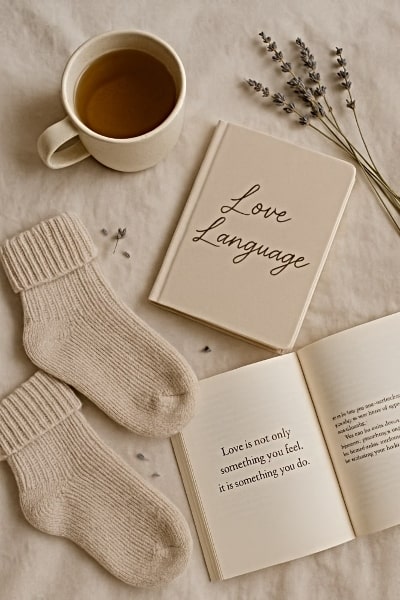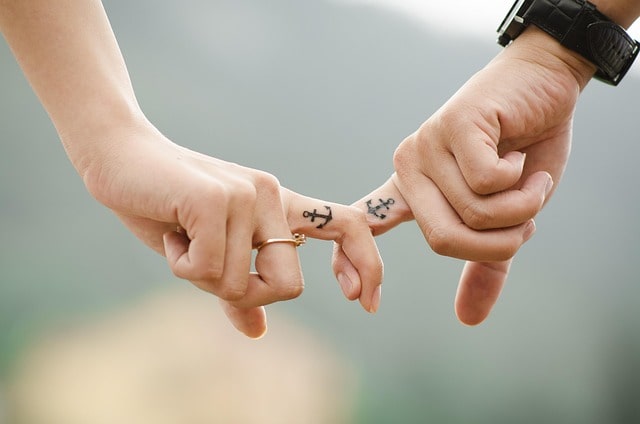
Lately, I’ve been listening to the audiobook The Five Love Languages by Dr. Gary Chapman. You might’ve heard of it—it’s one of those timeless relationship books that people always seem to mention. While it’s mainly geared toward married couples, the beauty of it is that the principles apply to all types of relationships: friendships, family dynamics, even how we love ourselves.
In case you’re not familiar, the core idea of the book is that everyone has a primary love language—a specific way they best receive and feel love. According to Dr. Chapman, there are five:
- Words of Affirmation
- Acts of Service
- Receiving Gifts
- Quality Time
- Physical Touch
The catch? If someone isn’t receiving love in their specific language, they can feel unloved—even if their partner is showing love, just in a different way. And often, we end up giving love in the way we naturally express it or how we received it growing up… which might not match our partner’s needs at all.
I Thought I Knew My Love Language…
When I first dove into the book, I was convinced—like, absolutely certain—that my primary love languages were words of affirmation and quality time. Maybe even physical touch, but more like a close third.
I mean, I love meaningful texts, handwritten notes, and hearing that someone appreciates me. I’m also big on spending uninterrupted time with people I care about. So, naturally, I thought I must be one of those people who equally values multiple love languages.
But then, in one of the later chapters, Dr. Chapman explained that most people truly have one primary love language—not two or three equally. He talked about a man who insisted he had two, and through questioning, it became clear there was actually one language that impacted him the most on a heart level.
That’s when it hit me: mine is physical touch.

A Gentle Realization Through Memory
It became so clear while I was listening to the chapter on physical touch. I found myself flooded with vivid memories—not just casual ones, but the kind that stick, even years later.
My boyfriend and I are in a long-distance relationship right now. And I started recalling these tiny but powerful moments of physical affection from when we were together in person:
- The time we were at a restaurant and he reached both his hands across the table to hold mine.
- When, even after our food came, he stretched his legs under the table to rest his feet on my stool—just to feel connected.
- That time in the car when I was lost in thought, and he slid his hand under the blanket to gently rest it on my thigh. I immediately felt grounded.
- When we were standing still, and he just pulled me in for a long, unprompted hug.
- When we were curled up on the couch, and he leaned closer to stroke my face softly while telling me I was beautiful.
It wasn’t grand gestures. It wasn’t big words. It was presence—simple, non-verbal physical connection. Those were the moments that stuck with me the most. And I don’t have the best memory, so the fact that I can recall them so clearly means they left a deep emotional imprint.
I always thought I might be uncomfortable with physical touch, maybe because I didn’t grow up with a lot of it. But that’s the thing. What’s foreign doesn’t always mean unwanted. Sometimes it’s just… unfamiliar. And when I do experience it in a healthy, intentional way, I thrive in it.
Childhood Reflections: A Deeper Layer
Realizing that physical touch is my love language unlocked some powerful memories from my childhood. My relationship with my mother was extremely rocky. I felt emotionally neglected—many times even unloved. But I vividly remember this one rare moment when I was a teenager going through something incredibly hard. My mom called me over to lay on the couch with her, and she just held me. That was one of the best moments of my life. No words. No fixing. Just presence and touch.
Other times, after we had huge fights—screaming matches that left me locked in my room telling myself I’d never forgive her—she would knock, apologize, and offer to go shopping. I didn’t care about the shopping. I never liked it. But when she pulled me in for a hug, something inside me melted. Every single time. It’s like the hug erased everything that came before it. For years, I didn’t understand why I forgave her in those moments.
Now I do.
It wasn’t the apology. It wasn’t the offer. It was the hug. That rare, fleeting moment of physical touch that, even if it came after chaos, made me feel safe—if only temporarily.

Toxic Love and Trauma Bonds
This revelation also cast a new light on a past relationship of mine—an eight-year on-and-off rollercoaster with a narcissistic partner. There was emotional manipulation, gaslighting, all the toxic traits you can think of. And yet, it took me so long to leave.
Looking back, I think one of the reasons I stayed was because—despite all the toxicity—he was incredibly physically affectionate. He needed to be cuddled every night. He held me constantly. It wasn’t always sweet, and definitely not grounded in healthy communication, but it fed something in me. After every hurtful argument, every manipulative episode, the physical connection became the reset button. I felt loved in those moments.
I now wonder—if my love language wasn’t physical touch, would I have stayed that long? Would I have tolerated that much?
And I can’t help but wonder if this explains why so many people stay in abusive or unhealthy relationships. Maybe they’re receiving love in one language they deeply value, even if the rest of the relationship is crumbling. Maybe it’s acts of service, or words of affirmation, or love bombing. But that one fulfillment might be enough to keep them hooked. It’s not weakness. It’s wiring.
Understanding your love language can be like putting on glasses after years of blurry vision. You finally see things clearly—why you do what you do, stay when you stay, long for what you long for.

Why It Matters In Healthy Love
So, what now?
Now I know. I know that I feel most loved through physical touch. And because I’m in a long-distance relationship, I also know that I need to communicate that clearly to my partner. Not so he can “fix” it, but so he can be aware of what truly fills my emotional tank. And I want to do the same for him.
Here’s what I’ve learned:
Understanding your partner’s love language helps strengthen your relationship by allowing you to:
- Communicate love in a way they truly feel and appreciate
- Avoid misunderstandings about how love is expressed
- Make your partner feel more valued and understood
- Intentionally show affection in their preferred method
- Create a deeper emotional connection by speaking their specific “language”
For example, if your partner’s love language is acts of service, doing helpful tasks will mean more than verbal compliments. If it’s physical touch, something as simple as holding their hand could be more meaningful than an expensive gift.
When you’re both attuned to each other’s love languages, it builds a foundation of emotional safety. It says, I see you. I hear you. I care enough to love you in the way that speaks most deeply to you.
What About Self-Love?
Let’s not forget the most important relationship of all: the one you have with yourself.
Knowing your love language can guide how you treat yourself, too. If yours is words of affirmation, start writing yourself loving notes. If it’s acts of service, create structure and support for your daily life. If it’s physical touch, allow yourself moments of softness—cozy blankets, warm baths, gentle self-massage. Nourish yourself the way you feel most loved.
Final Thoughts
I never expected to learn so much about myself just by listening to an audiobook. But this realization—that physical touch is my primary love language—has helped me connect the dots between my past, my present, and what I want for my future.
Whether you’re single, dating, married, or working on your relationship with yourself, I really recommend giving The Five Love Languages a read or listen. It’s more than just a relationship tool—it’s a window into your emotional blueprint.
If you’ve had a similar realization or learned something about yourself through this book (or anything else), I’d love to hear it. I think when we share these “aha” moments with each other, it helps us all grow. Plus, it’s just fun to talk about self-discovery with someone else who gets it.
Until next time,
Take care and keep loving deeply—
Starting with you! 💛


